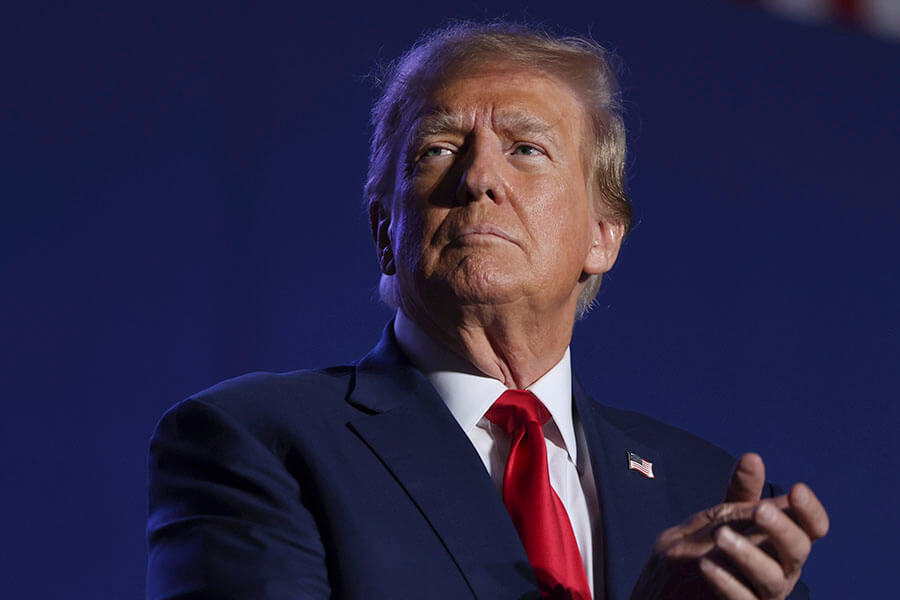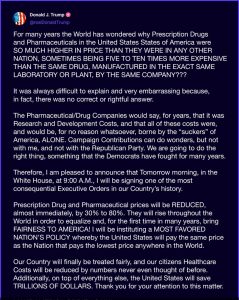
Nigerians May Pay More for Medicines After Trump’s Pharmaceutical Price Cuts

Nigerians may pay more for prescription drugs following President Donald Trump’s announcement of price reductions in pharmaceuticals within the US.
The move, said to slash drug prices for American consumers, may have unintended consequences for countries like Nigeria that heavily depend on imported medicines, according to an analysis by The Cable.
In a late-night post yesterday on Truth Social, Trump revealed plans to sign an executive order that would reduce prescription drug prices in the US by 30 to 80 per cent.

Explaining the rationale, he criticised pharmaceutical companies for inflating drug prices in the US, allegedly to recoup research and development costs, making American consumers bear the brunt of global healthcare costs.
This new policy, he said, would implement a “Most Favoured Nation” clause, ensuring the US pays no more than the country with the lowest drug prices globally.
While the executive order is framed as a domestic policy, experts warn it could ripple through global pharmaceutical markets. Pharmaceutical companies might respond by raising prices in other countries or limiting drug supply to maintain profit margins.
For instance, Nigeria, where over 70 per cent of medicines are imported, could be hit hard. With the local pharmaceutical industry supplying only about 25 per cent of domestic demand, Nigerians remain vulnerable to global price fluctuations, foreign exchange volatility, and supply chain disruptions.
The country’s total healthcare spending is estimated at $10 billion, of which medicines account for nearly $4 billion. Out-of-pocket expenses comprise 62 per cent of Nigeria’s healthcare spending, mainly due to limited health insurance coverage. Therefore, any increase in drug prices will be borne directly by consumers, exacerbating existing economic inequalities.
Health experts warn that branded and speciality medicines, already expensive, could become even more unaffordable for ordinary Nigerians. This would be particularly concerning for treatments for chronic conditions like diabetes, hypertension, cancer, and infectious diseases.
With previous Trump administration policies involving reviews and freezes of foreign aid, there are fears that changes in US pharmaceutical procurement strategies might affect the availability of affordable or donated medicines to Nigeria.
This could jeopardise the fight against HIV, tuberculosis, and malaria, for which Nigeria depends on international assistance.
Recently, Sickle cell patients in Nigeria have taken to social media to express frustration over the rising cost of routine medications and the absence of government support, as the country grapples with the economic fallout of President Bola Tinubu’s policies.
Read Also:
About The Author
Related Articles
Tinubu Government Delays Release of Signed Tax Acts to the Public
Four days after President Bola Tinubu announced the signing of four tax...
ByMayowa DurosinmiJune 30, 2025As Tinubu Urges Africa-Caribbean Unity in Saint Lucia, Over 272 Nigerians Killed in June Alone
While Nigerians deal with deadly violence, worsening hunger, and mass flooding, President...
ByWest Africa WeeklyJune 30, 2025You Can’t Tax a Dead Economy: Nigeria Is Suffocating Under Its Own Policies
As Nigeria’s Central Bank clings to its benchmark interest rate of 27.5...
ByWest Africa WeeklyJune 30, 2025“Wike is Not a Blessing to Us, He’s a Disaster” — Workers Protest in Nigeria’s Capital Over Unpaid Wages, Poor Working Conditions
Staff members of the Federal Capital Territory Administration (FCTA) in Abuja barricaded...
ByOluwasegun SanusiJune 30, 2025












Leave a comment